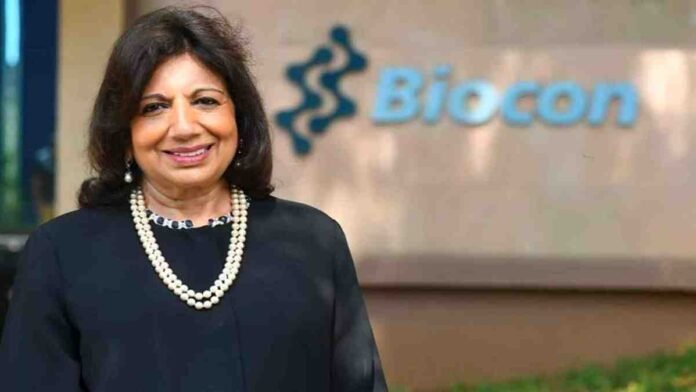Kiran Majumdar described her fascinating experience of starting Biocon from beginning in the educational podcast “WTF” with Zerodha’s Nikhil Kamath. She began with barely Rs 10,000 in her pockets, met important individuals, and took risks as needed.1000
Let’s learn about India’s first self-made woman and how she battled patriarchy to develop the groundbreaking enterprise.
Kiran was denied medical school admission. She studied zoology at Bangalore University. She won the gold medal and was the University’s best student.
Her father was the first person to produce King Fisher beer. He recommended studying brewing at the master’s level in Australia. In 1974, she made the risky decision to pursue her master’s degree in brewing in Australia. She returned from Australia about the time she turned 21.
Indian Patriarchy: A Serendipitous Experience
She was not hired by the brewery industry. According to Kiran on the podcast, “India wasn’t ready for a woman to be a brewer.”
She received the offer from a Scottish company in 1978. She agreed to the offer and made plans to travel to Scotland.
She happened to meet an Irish biotech entrepreneur by accident. She was traveling from Baroda to Delhi on the Rajdhani Express. She was persuaded by that businessman to establish an enzyme manufacturing company in India with the aid of a product purchase guarantee.
Beginning of BioCon and the Prolonged Journey
She launched Biocon, a “strange company,” when she was 25 with Rs 10,000 in the bank. It was 1978. She had to contend with male domination in the marketplace since banks were reluctant to lend her money and employees were reluctant to work for a woman. Her first two workers were two former tractor mechanics who were desperate for work. She began in her garage and a shed. The Irish guy progressed to purchasing those enzymes after promising a repurchase for the goods.
After being impressed by her concept and firm, Dinesh Nayar, a banker at Canara Bank, finally assisted her. He gave her a loan when she needed money to develop enzymes.
She soon began meeting with IIT students and promoting her ground-breaking business. The efforts weren’t in vain because several IIT students joined her as a result of being inspired by what she had already accomplished. The quartet included: Shree Kumar Arun Chandravarkar, Murali Krishnan, Ajay Bhardhawaj, and Sunil Narayan.
I have always believed that entrepreneurship is the only option for a nation like India to expand and thrive as a global economy. As senior citizens, we make sure to foster entrepreneurs, Kiran said on the episode.
Unilever entered the picture and met a partner in life and business.
Irish stockholders in BioCon sold Unilever a portion of their interests, which made up about 30% of the entire number of shares. She and Biocon were transformed from an inexperienced business into a more professional entity. She had to adhere to more rules, international standards, financial reporting, and other requirements.
She first met John Shaw in the early 1990s; he would later become her spouse and business partner. The couple wed in 1998. Later, John assisted Kiran in purchasing 30% of BioCon back from Unilever for $2 million. John had to sell her property in the UK, as well as “all his savings,” in order to make a profit.
Finally, ICICI Venture prepared to trade $2 million for 10% of the shares that AIG later purchased for $400 million.
By creating new items, Kiran maintained her business inventive and adventurous while keeping up with market and customer demand. To broaden its business beyond the manufacture of solely enzymes, they began concentrating on biopharmaceuticals. The plan was a great success and it worked.
Later, she concentrated on creating recombinant human insulin to reduce the market’s dependency on animal insulin, which commanded a significant portion. In 2004, BioCon became the first company to release recombinant human insulin.
The company’s worth in billions of dollars skyrocketed the same year it announced its first initial public offering, making Kiran Majumdar Shaw the first self-made woman entrepreneur in India.
She had to deal with a lack of money and a society that was dominated by men, making the voyage difficult. Women and next-generation entrepreneurs alike were motivated by her unshakable determination to create an entirely new type of business in India.



